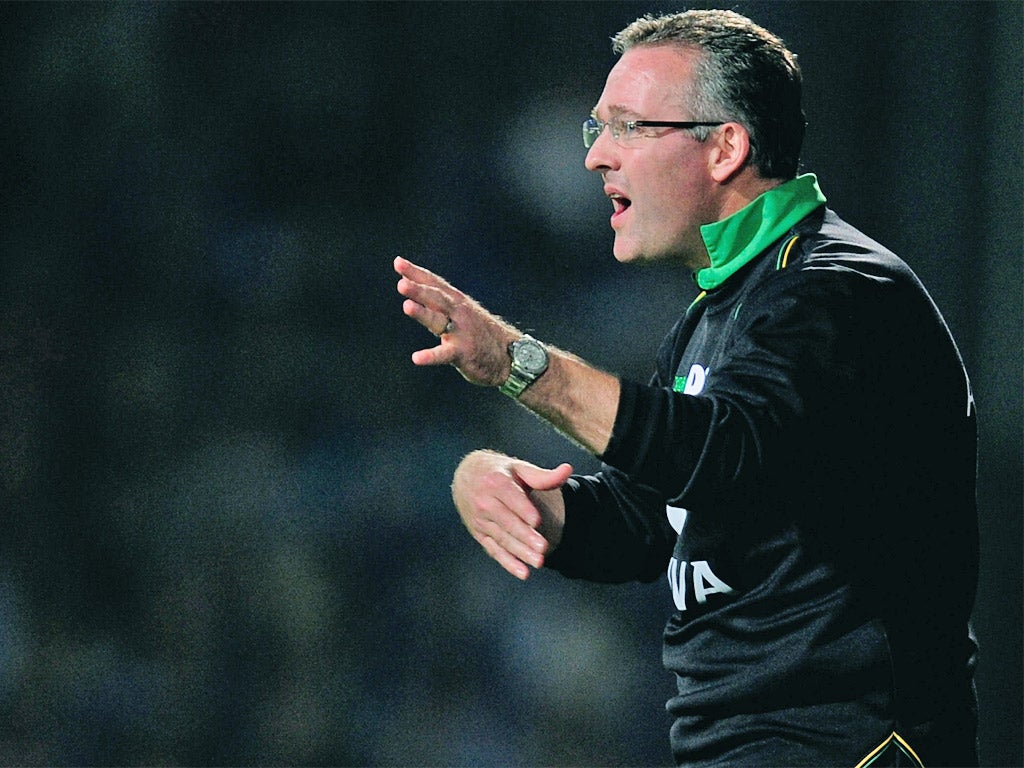Bright spark hot on heels of O'Neill
Paul Lambert's eagerness to learn has helped him shoot from Wycombe to the big time and tonight he takes his high-flying Canaries to meet his old mentor. Simon Hart reports

It was summer 2006 and Ivor Beeks was considering the credentials of a youthful candidate for the position of Wycombe Wanderers manager when he decided to call an old friend. The feedback was positive and, with that box ticked, Paul Lambert followed in the footsteps of Martin O'Neill, the Wycombe chairman's sounding board, by taking the reins at Adams Park.
Lambert was then 36, just a year younger than O'Neill had been when Beeks appointed the Northern Irishman as Wycombe manager in 1990. Such has been his progress since, he was 12 months ahead of O'Neill – 42 to the latter's 43 – when managing his first Premier League match in August and tonight will face his former Celtic boss for the first time in an opposition dugout as his buoyant Norwich City side visit Sunderland.
Beeks, for one, is not surprised by Lambert's success in steering Norwich from League One into the top half of the Premier League and sees certain similarities with O'Neill, under whom the Scot won seven trophies at Celtic.
Besides the touchline accoutrements of tracksuit, spectacles and water bottle, Beeks notes that Lambert mirrors O'Neill with the presence of a No 2 who has followed him since his Wycombe days. "Martin [has] Steve Walford and Paul has Ian Culverhouse – two very good coaches. Paul has people around him that he knows he can trust."
Lambert's two years at Adams Park – featuring runs to the Carling Cup and League Two play-off semi-finals – offered evidence too of the O'Neill-style motivational powers which are bringing the best out of an unsung Norwich squad. "You don't get that sort of spirit by just walking into a dressing room and dishing out tactics. Individual players need individual attention. It is about being able to notice which ones want more attention than others and I think he has got that," added Beeks.
Buckinghamshire offered a first glimpse of Lambert's managerial qualities at work, following an unhappy, short-lived stint as Livingston's player-manager, but it was in the Bundesliga, a decade earlier, that he was already "thinking, acting, behaving like a manager" according to Ottmar Hitzfeld, his coach at Borussia Dortmund.
Hitzfeld signed Lambert in 1996 after he had shone in a Uefa Cup tie against Dortmund; he departed for Germany an unheralded Motherwell midfielder with two Scottish caps, yet returned home in late 1997 with a European Cup winner's medal.
Hitzfeld said: "He was always a leader. Not only was he important when we were on the pitch, he was a kind of anchorman off it. He always kept an eye out on the younger players, and looked after them when they were struggling."
It was 15 years ago in May that Lambert, in a defensive midfield role, helped shackle Zinedine Zidane as Dortmund earned a 3-1 Champions League final victory over Juventus. "He was one of the keys that opened the door to that final," added Hitzfeld. "He was what I call a game reader. He may see things even better from outside than when he was right in the middle of it, so it is no surprise for me that he has become a successful manager."
Hitzfeld texted Lambert when Norwich gained promotion and another message from Germany came from Erich Rutemöller, the German FA coach who oversaw his Pro-licence course in Cologne in 2004. The only non-German on the course, Lambert left a positive impression. "Paul was very curious, he wanted to learn. He was a good player but he knew that did not mean he was a good coach. He wanted to do all the different steps in the different lessons – it is not only about football, it is about psychology, sports medicine, pedagogy, about kinds of training."
Lambert would sit beside an English-speaking former German women's international, Maren Meinert, for language queries but played an active role. "It was very interesting to watch the other participants listening to him because they wanted to know his way of tactical thinking, while he was carefully listening to the German coaches."
Of the German FA's class of 2004, it is Lambert, the boy from Glasgow, who became the first to coach in one of Europe's big leagues. Now for his reunion with O'Neill. "What he has done at Norwich has been remarkable," said the Sunderland manager, who admits he sees "traits of Paul" in Norwich's play. "Paul at Dortmund was a defensive midfielder but at Celtic, when I got there, he was into his time and gained confidence and enjoyed an attacking role so there is probably a mixture," he said.
O'Neill recalled discussing Lambert's managerial ambitions during the twilight of his Celtic career. "He did ask if he could take his badges in Germany because he had a great affinity with his time in Dortmund, so I said yes, absolutely go and do it." If that represented good advice, so were the words he shared with Ivor Beeks at Wycombe six years ago. "I said I thought he might be worth a little look at, and he did very well indeed." Didn't he just.
Subscribe to Independent Premium to bookmark this article
Want to bookmark your favourite articles and stories to read or reference later? Start your Independent Premium subscription today.

Join our commenting forum
Join thought-provoking conversations, follow other Independent readers and see their replies